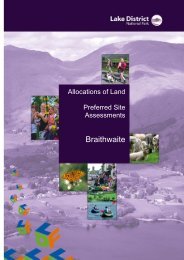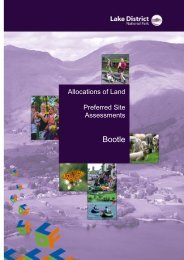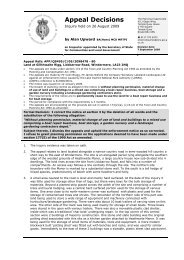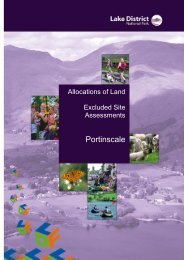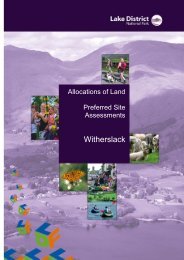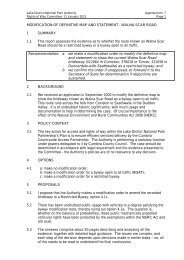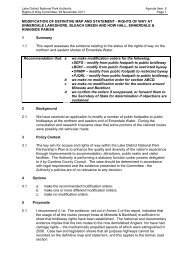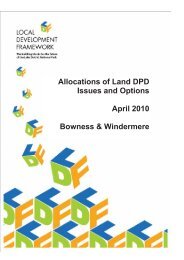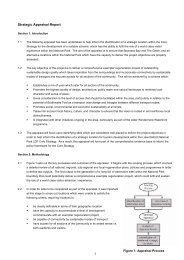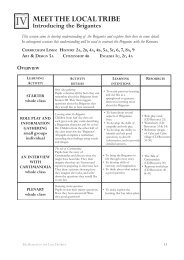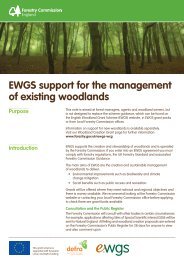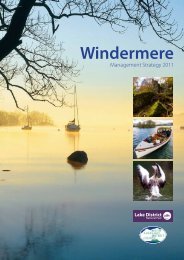The Partnership's Plan - Lake District National Park
The Partnership's Plan - Lake District National Park
The Partnership's Plan - Lake District National Park
Create successful ePaper yourself
Turn your PDF publications into a flip-book with our unique Google optimized e-Paper software.
3.14.2 Recent activities and successes<br />
<strong>The</strong> following policy context is relevant:<br />
• <strong>The</strong> Climate Change Act is the key policy driver.<br />
• UK Low Carbon Transition <strong>Plan</strong> (published summer 2009) – <strong>The</strong> UK’s strategy for<br />
meeting national carbon budgets, which envisages a significant role for Local Authorities<br />
as catalysts of low-carbon action.<br />
• <strong>Lake</strong> <strong>District</strong> <strong>National</strong> <strong>Park</strong> Transport Framework – see Transport section<br />
• North West Climate Change Action <strong>Plan</strong> – sets out the NorthWest regional approach<br />
• Vital Uplands – a ‘2060 Vision for England’s Upland Environment’ – developed by Natural<br />
England with partners for England’s upland environment in a changing climate.<br />
• English <strong>National</strong> <strong>Park</strong> Authorities Association Climate Change Adaptation – a<br />
template has been produced to assist <strong>National</strong> <strong>Park</strong> Authorities and their partners in<br />
climate change risk management across a range of themes.<br />
Research for the Low-carbon <strong>Lake</strong> <strong>District</strong> was carried out over a period of eight months.<br />
Case studies were selected to reflect a range of private, public and voluntary sector initiatives.<br />
Recent successes include:<br />
Ten case studies are presented in the Low-carbon <strong>Lake</strong> <strong>District</strong> Report that provide an<br />
insight into the good work occurring in the <strong>Lake</strong> <strong>District</strong> to help address climate change. In<br />
addition:<br />
• Bassenthwaite Reflections provided funding for a demonstration wood fuelled heating<br />
system at Bassenfell Manor.<br />
• <strong>The</strong>re are also a range of woodfuel case studies by the Forestry Commission:<br />
www.forestry.gov.uk<br />
3.14.3 Opportunities<br />
We must keep up to date with the predictions of climate change but also consider the likely<br />
impacts on the <strong>Park</strong> in the future. <strong>The</strong>se include:<br />
• Extreme weather events, including more intense winter rainfall<br />
• Migration of habitats to higher altitudes and resulting loss of reliant species<br />
• Loss of indigenous species, and an increase in non native species<br />
• Changes to rivers and lakes (water levels , water quality and nutrient status)<br />
• Increased water resource requirement<br />
• Changes to woodlands (storm damage and drought)<br />
• Drying out of peat and<br />
• Accelerated erosion and landslips.<br />
We can respond in two ways; both offer opportunities. We can adapt to climate change<br />
through our organisational strategies. And we can reduce emissions of carbon dioxide and<br />
other greenhouse gases. We need to encourage residents, visitors and businesses to do both,<br />
as they are doing in Patterdale and Borrowdale, for example. Farming communities will need<br />
support in adapting to delivering ecosystem services as part of an integrated and sustainable<br />
business model.<br />
59



